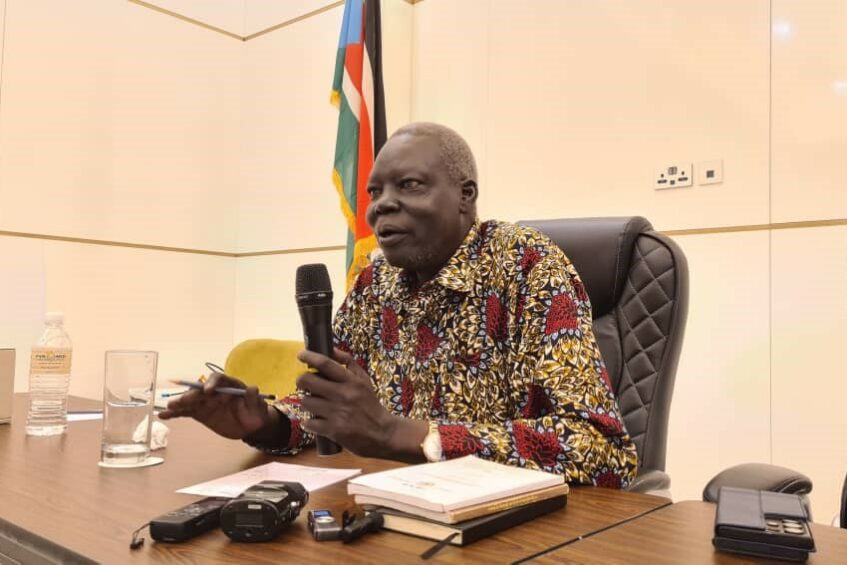
Ruben Madol, Minister of Justice and Constitutional Affairs speaking during a meeting with Judiciary Reform committee on Sat, 9th March 2024. (Photo/Charles Wote/Eye Radio).
The Minister of Justice and Constitutional Affairs said the independence of South Sudan judiciary has been compromised by the interference of non-legal personnel in the work of courts in the country.
Ruben Madol made the remarks while presenting his views to the Judiciary Reforms Committee (JRC) on the independence, structure, and the type of judiciary system that South Sudan adopted in 2011.
Madol said the impartiality of the justice system has been impacted by many challenges, one of which is the interference by none legal individuals allegedly exercising the powers of judges.
“A number of things are a problem of the judiciary of South Sudan, one of them being challenges to the independence of the Judiciary as a pillar of governance,” he said.
“It is a big challenge, because at certain stages in the development of the judicial institution, judicial powers have been exercised not just by judges, but even by none judges; those who are not trained in law.”
Minister Madol said meddling in the professional work of judges negatively affects the independence of the judiciary system.
He called for non-interference in the judiciary work to pave way for an effective justice system in the country.
“There should be no interference with the professional work of courts and therefore decisions of judges are still a big challenge.”
Minister Ruben Madol further emphasized on the need to fund the judiciary through a consolidated account to enhance the institution’s independence and integrity.
“Again, the context of the independence of the judiciary, resources that are required for the Judiciary to function by law have to come from a consolidated account.”
“The Judiciary has the independence to manage these resources in as much and for as long as it is accountable to the public on how these resources are managed.”
The Judicial Reforms Committee has so far engaged with key government institutions to hear their views and recommendations on reforming the judiciary system as enshrined in the 2018 peace deal.
It was formed in 2022 to review relevant laws, advise on judicial reforms and restructuring the judiciary to enhance its effectiveness.
In February 2024, the national cabinet extended JRC mandate for another two months to enable the committee to complete pending tasks.
James Ogoola, Chairperson of the Committee, said the committee expects South Sudan to implement the reforms recommendations to have an efficient and professional judiciary that can delivery justice without fear or favor.
“We want a judiciary that is efficient, a judiciary that is effective, a judiciary that is professional, a Judiciary that is competent, and one that delivers access to justice for its court users,” Ogoola said.
“We need a Judiciary that’s independent, impartial, and which delivers its work without fear from anybody or favor to anybody. Judiciary which has properly established systems which has appropriate tools for its job.”
Support Eye Radio, the first independent radio broadcaster of news, information & entertainment in South Sudan.
Make a monthly or a one off contribution.
Copyright 2024. All rights reserved. Eye Radio is a product of Eye Media Limited.